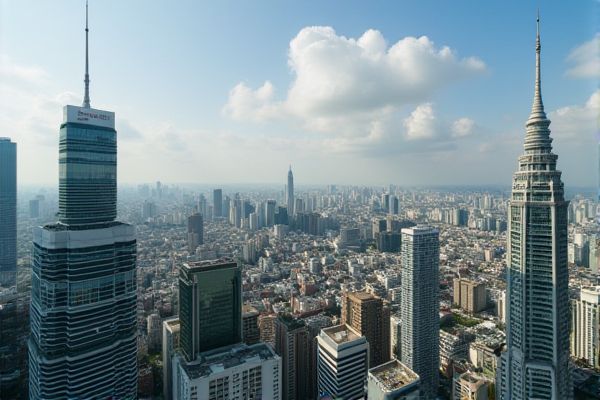
What to know as new resident in Thailand: Local customs and traditions. Basic Thai language phrases. Cost of living. Healthcare options. Transportation systems. Visa and immigration regulations. Housing and accommodation. Weather and climate patterns. Banking and financial services. Food and dining etiquette.
Local customs and traditions
As a new resident in Thailand, it is important to understand local customs and traditions, such as the use of the right hand for eating and passing items, the significance of the *wai* gesture, and the observance of Buddhist holidays like Songkran, Loy Krathong, and Makha Bucha Day. Additionally, respecting the cultural practices of various hill tribes and following dining etiquette, such as using a spoon and fork correctly, will help you integrate smoothly into Thai society. To learn more about these fascinating cultural aspects, visit the Entriva website and delve into the rich tapestry of Thailand's traditions.
Basic Thai language phrases
This guide provides a comprehensive list of essential Thai words and phrases for greetings, transportation, ordering food, and handling common situations, including phrases like "Sawasdee" for hello, "Khob khun" for thank you, and "Sabai dee mai" for how are you, to help new residents communicate effectively and navigate daily life in Thailand. For a detailed understanding of these terms, explore the Comprehensive Guide to become acquainted with Thai language essentials that are invaluable for both travelers and those settling in the vibrant culture of Thailand.
Cost of living
The cost of living in Thailand varies by location, with a minimum baseline of $700 per month in Chiang Mai and around $850 in Bangkok, covering expenses such as rent, utilities, food, transportation, and evenings out. This comes with the ability to live more luxuriously or frugally depending on personal lifestyle choices. For a detailed breakdown of expenses in Chiang Mai, you can visit the A Little Adrift website, which offers comprehensive insights into living costs and lifestyle options in this vibrant city.
Healthcare options
Thailand offers a diverse range of healthcare options, including public hospitals with free care through the Universal Coverage Scheme (UCS). However, these facilities can often be overcrowded and may have outdated equipment. On the other hand, private hospitals are renowned for their high standards, English-speaking staff, and shorter waiting times, albeit at a significant cost. This makes health insurance a necessity for many. Popular private hospitals include Bumrungrad International Hospital and Samitivej Hospital. In addition, expats can access outpatient care through international clinics and specialized services like dental and mental health care. For more detailed guidance on navigating healthcare options and other aspects of living in Thailand, you can refer to the Expat Guide Thailand.
Transportation systems
As a new resident in Thailand, you should be aware that the country has a diverse transportation system, with Bangkok offering the most robust options including the BTS and MRT urban rail systems, an extensive bus network, motorcycle taxis, and tuk-tuks. For those planning for longer journeys, buses and trains are prevalent, ensuring connectivity across cities. Additionally, platforms like Expatica provide valuable insights for navigating Thailand's transportation. For shorter trips within the city, Grab and traditional taxis are also widely available, providing convenience and flexibility.
Visa and immigration regulations
To navigate visa and immigration regulations in Thailand, you need to understand the various visa types, such as tourist visas (up to 60 days with a possible 30-day extension), non-immigrant visas (initially valid for 90 days and extendable for specific purposes like business, education, or retirement), and new categories like the Destination Thailand Visa (allowing up to 180 days per entry). Each visa has specific requirements, including documentation, financial proof, and application procedures through Thai embassies or consulates.
Housing and accommodation
When moving to Thailand, you can choose from a diverse range of accommodation options including apartments, condominiums, houses, and serviced apartments. It is advisable to consider factors like location, proximity to amenities, and budget, with most expats opting to rent due to the ease of the rental process and the challenges of owning property as a foreigner. For further insights, visit the Expat Arrivals website to explore comprehensive guidance on securing the ideal living space in Thailand.
Weather and climate patterns
Thailand's climate is characterized by three distinct seasons: the hot season from March to May, the wet season from May to October dominated by the southwest monsoon, and the cool season from November to February marked by the northeast monsoon, bringing cooler and drier air. The weather varies significantly across regions, with the north experiencing more pronounced temperature changes and the south having less distinct seasonal variations. For more detailed information about Thailand's weather patterns, visit the Met Office website.
Banking and financial services
To open a bank account in Thailand as a new resident, you need a valid visa (not a tourist visa), proof of address, and sometimes a work permit. Major banks like Bangkok Bank, Kasikorn Bank, and Siam Commercial Bank offer various account types, debit cards, and online banking services in English. For more detailed information, visit the Thailand Privilege webpage to understand the essentials of navigating banking and finances in Thailand as an expatriate.
Food and dining etiquette
In Thailand, dining etiquette is a fascinating blend of customs designed to show respect and harmony at the table. It includes using a spoon in the right hand and a fork in the left to guide food onto the spoon, while avoiding eating with your left hand. It's important not to blow your nose or lick your fingers at the table, and leaving a small amount of food on your plate is a polite way to indicate you are full. Moreover, respect for communal dining is paramount, which involves taking moderate portions from shared dishes and refraining from taking the last bite from the serving bowl. For more insights into these practices, you can learn more at the Chiang Mai Ambassador website. Adhering to these etiquettes ensures a harmonious and enjoyable dining experience in Thailand.
